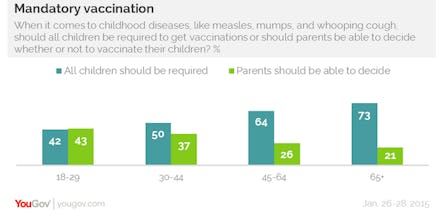1 in 4 Millennials Still Don't Understand How Vaccines and Autism Work

The anti-vaccination movement, which claims that childhood vaccinations cause autism and other chronic conditions, enjoys no support or empirical evidence from the medical community. They are wrong, and, as a recent outbreak of the formerly eradicated measles virus in Disneyland illustrates, they are very dangerous.
Yet a recent YouGov survey of 1,000 adults has troubling news: Anti-vax conspiracy theories are finding their way into the minds of the next generation of Americans.
The youngest age group sampled in the poll, those ages 18 to 29, were significantly more likely to believe that early childhood vaccinations "definitely" or "probably" are the cause of autism. In fact, more than 1 in 5, or 21%, young adults did:
These same young adults were also dramatically less likely to support mandatory vaccinations for all children than older generations, with slightly more — 43% — in support of letting parents decide than requiring all children to receive the shots:
Overall, 57% of Americans continued to support mandatory vaccination. But the message heard by YouGov is clear: Many young people are more skeptical of the benefits of vaccination than previous generations.
There's some misplaced trust here: A separate poll conducted recently by Pew Research Center came up with different numbers. A greater percentage of Americans, 68%, supported mandatory vaccines. But even that number was a far cry from the 86% of scientists polled in favor of such a program.
The threat is serious enough to warrant action. According to the Centers for Disease Control and Prevention, the ongoing measles epidemic is the worst in 20 years. Young people weren't living in a time when the measles, whooping cough and the mumps threatened every American; in the decade before the measles vaccination began, preceding 1963, measles alone caused 3 million to 4 million cases of illness a year, of which 48,000 were hospitalizations and 400 to 500 resulted in death. Maybe they're getting more of their news from dubious sources on the Internet. That, or the rising prominence of anti-vaccine advocates like Jenny McCarthy has exposed them to more faulty arguments against vaccination.
Either way, this is a dangerous trend and the anti-vaxxers show no signs of slowing down, even when confronted with the Disneyland measles outbreak. The New York Times reports that many appear to be doubling down on their opinions instead. Various commentators have proposed solutions ranging from stripping anti-vaccine doctors of their medical licenses and prosecuting anti-vaxxers for negligence to making the shots mandatory. Without some kind of action, the problem seems bound to get worse.
h/t Vox